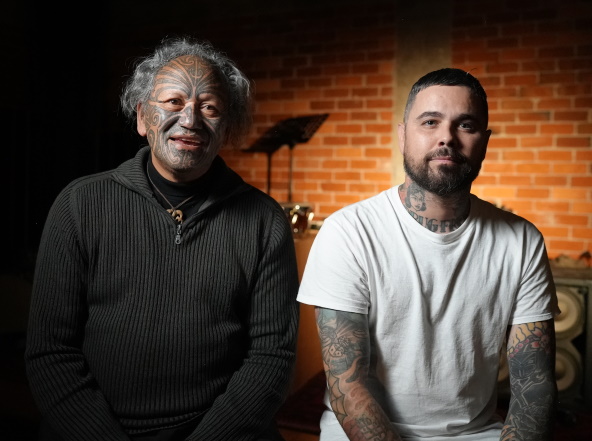31 July 2023
Punk attitude translated into te reo Māori

Senior Adviser Māori Partnerships Daniel Hauraki (left) was a language consultant for the translation into te reo Māori of Probation Officer Angelo Munro's song All that Glitters.
When Waitakere Community Corrections Probation Officer Angelo Munro is not at work, you’ll hear him making music with Punk band Bleeders. Angelo is the band’s lead singer and they have toured, won a few music awards and lived overseas, and for the first time they are translating one of their songs into te reo Māori.
Bleeders are part of the latest Waiata Anthems release, translating their song, All That Glitters. Waiata Anthems are iconic tunes from Aotearoa translated into te reo Māori, and the latest waiata are being released throughout July.
For lead singer Angelo Munro, hearing his song transformed into te reo Māori was hugely special. The song was first released in 2003 – “20 years later we’re still here!” says Angelo. The te reo Māori version of his song was written by Senior Adviser Māori Partnerships Daniel Hauraki, and is an interpretation capturing the feeling of ‘all that glitters’.
“It's about self-autonomy, rangatiratanga, about people being who they truly want to be and being able to live out their life and their own world view.
"All that Glitters is about being done with the old and starting something new. I come from a Punk background which used to be 'F.. the system' but now for me is an attitude, an ideology. I know now that the way to change the system is from within.”
Angelo’s story is featured in a short documentary produced by Waiata Anthems, discussing his experience with the translation as well as his work as a probation officer. His decision to become a probation officer three years ago was based on a belief that he could be an asset to the department. “I just felt like, people like myself with my views, could be an asset to the department and help support people to make change.”
As part of the documentary, he talks about his experiences with Hōkai Rangi, which for him means being accountable for his actions and ensuring he adapts the way he approaches situations to meet the needs of those he works with. “We’ve had to learn how to work better with Maori, understanding te ao Māori, and learning about tikanga.”
In the short documentary which follows Angelo at a tikanga Māori programme, he talks about the importance of the programme that allows participants to acknowledge their mistakes in order to heal.
One of the participants expresses how this is the first time he has had the chance to learn about his culture and himself and learn to value himself instead of being labelled ‘the repeat offender.’”
“That’s why this kaupapa is so important. How great would society be if everyone felt they belonged and their wairua was filled to the brim?” says Angelo.
Ready to make a move?
Start your journey - check out the a list of our current opportunities then apply online today!